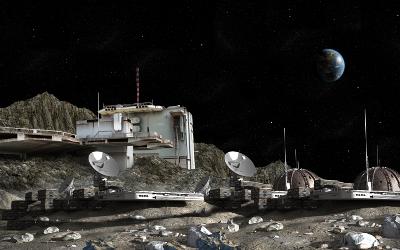New space agency funding brings living on the Moon one small step closer

The UK Space Agency (UKSA) has awarded OU space researchers close to £175,000 to develop a one of a kind construction method that could one day enable us to build on the Moon from lunar soil. Using the natural satellite’s readily available resources as building materials would finally overcome the prohibitive and astronomical cost of transporting raw materials through space.
The process is the brainchild of Dr Sungwoo Lim and his colleagues Professor Mahesh Anand, Dr Andrew Morse and Dr James Bowen, from The University’s world-leading Space Instrumentation Group. It uses a state-of-the-art microwave generator called the Microwave Heating Demonstrator (MHD) concept to melt moon soils. These molten soils can then be 3D printed and cooled to form construction components even more solid than concrete.
Previous UKSA funding has enabled the researchers to develop and test the MHD concept on Earth at The OU’s Milton Keynes Campus. This latest award builds on this work and will allow them and industrial partners, Added Value Solutions UK Ltd. and Viper RF to create a prototype instrument to go to the Moon as part of a future European Space Agency (ESA) mission.
Traditional microwave ovens create microwave energy using a magnetron vacuum tube to produce heat by agitating polar molecules, such as water in foods. In contrast, the OU researchers and their industrial partners will utilise a silicon transistor-based Solid-State Power Amplifier (SSPA) to develop a much smaller, lighter space-certified microwave generator for the MHD payload to go to the Moon. These solid-state microwave generators are typically used in wireless telecommunication networks and do the same job as a microwave, but with better control, energy efficiency, durability and consistency. These qualities make them ideally suited for the hostile space environment.
“The result will be a more precise and efficient microwave heating device that uses just 250 Watts to melt lunar soil compared to most microwave ovens’ 1,000 Watts”, Lim explains. “This efficiency is essential to operate instruments on the moon’s surface, as available power through the lunar lander’s battery and solar panel is limited to the mission payload requirement defined by the ESA or NASA.”
The latest UKSA funding will also enable the researchers to test their microwave’s ability to extract water and oxygen from lunar soil, paving the way for sustainable settlements on our nearest neighbour in space and further space exploration.
“If we can create all we need to sustain life and build a functioning moon base using its natural resources, the natural satellite could become a stepping-stone to space odyssey, missions to Mars and beyond the solar system,” notes Lim.
The same technology could also tackle challenges back on Earth. Lim and his colleagues are already exploring the potential to apply these methods to cheaply and efficiently 3D print homes in developing countries, quickly construct shelters following natural disasters and build organically-shaped frames to regrow damaged coral reefs underwater.
The OU was recently among ten organisations to receive a boost from the UKSA regional funding, following the UK Government’s Levelling Up White Paper launch, which set out policy interventions to improve opportunity and boost livelihoods across the country following the pandemic. Part of the Arc for Space Group within the Oxford Cambridge Arc Universities Group, the OU’s share of the funding will allow it to continue to drive space sector growth ambitions in the region alongside industry partners.
Related content:
- OU wins UK Space Agency funding to grow regional space activity
- OU research into 3D printing on the Moon receives funding
- New bespoke industrial microwave to investigate building on the Moon
- Learn more about OU space research
- Find out about postgraduate research opportunities in the School of Physical Sciences
Contact our news team
For all out of hours enquiries, please telephone +44 (0)7901 515891
Contact detailsNews & articles

Grant recipients announced for the 2025 Open Business Creators Fund for Women in Business
The businesses selected to receive funding from the Open Business Creators Fund for Women in Business, (delivered by The Open University and sponsored by NatWest) have been announced.